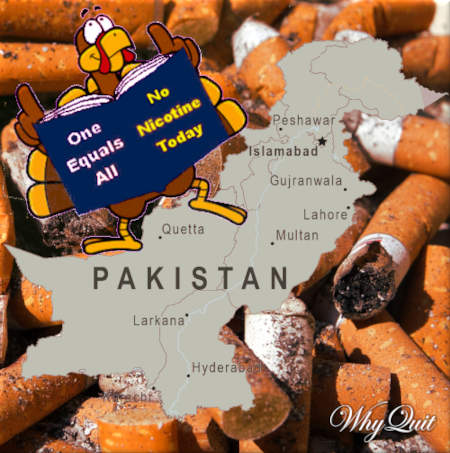
How smokers quit in a lower-middle-income country

How do smokers stop smoking in lower-middle-income nations where the average income, in U.S. dollars, is $1,046 to $4,095?[1] A July 18, 2021 BMC Public Health study investigated quitting in Pakistan, where 64% of smokers have no formal education.[2]
Researchers surveyed 330 former smokers in Karachi, Pakistan who were at least 18 years old, who had smoked at least 100 cigarettes in their lifetime and had been quit for at least 1 month.
They found that 62% had quit smoking cold turkey and that only 10.9% quit while using approved quitting products (most by using NRT – 8.2%).
Shockingly, they discovered that 50.3% of successful ex-smokers had succeeded on their very first quitting attempt.
Among first attempt quitters, abrupt cessation (cold turkey) was 4 times as effective, while use of approved quitting products was 80% less effective.
“Interestingly in our study, use of a smoking cessation aid was negatively associated with quitting on the first attempt, a finding corroborated by a survey by Manis et al. in Switzerland,” wrote the authors, a high-income country ($12,696 or more).
The 2018 Swiss study was a prospective hospital employee study of 763 successful ex-smokers. It found that 53% succeeded on their first attempt ever, that 77% quit unassisted, with just 6% using approved products (4.5% NRT).[3]
Sandwiched between these studies, a 2020 U.S. prospective study followed 2,043 quitters. There, Table 1 data indicate that unassisted quitting was 4.2 times as productive and 24% more effective than approved products at 12+ months.[4]
The new Pakistan study identified several additional factors associated with first attempt success. They include being married, having a negative self-image of being a smoker, convincing yourself that you have the ability to resist an urge to smoke, and the ability to consciously distract yourself during moments of challenge.
A major hurdle in nations with low adult literacy rates is teaching smokers the keys to successful abrupt nicotine cessation (see Smart Turkey).
The answer may rest in the use of short video and audio lessons, employing techniques similar to those seen in a 2015 Pakistani video sharing the core message from Joel Spitzer’s 1984 "My Cigarette, My Friend" article.
References
1. The World Bank, World Bank Country and Lending Groups. July 1, 2020
2. Martins RS, Junaid MU, Khan MS, Aziz N, Fazal ZZ, Umoodi M, Shah F, Khan JA. Factors motivating smoking cessation: a cross-sectional study in a lower-middle-income country. BMC Public Health. 2021 Jul 18;21(1):1419. doi: 10.1186/s12889-021-11477-2. PMID: 34275456. Link to free full-text PDF: https://bmcpublichealth.biomedcentral.com/track/pdf/10.1186/s12889-021-11477-2.pdf
3. Manis M, Tamm M, Stolz D. Unaided Smoking Cessation in Healthy Employees. Respiration. 2018;95(2):80-86. doi: 10.1159/000481826. Epub 2017 Nov 7. PMID: 29131057. Link to free full-text PDF: https://www.karger.com/Article/Pdf/481826
4. Pierce JP, Benmarhnia T, Chen R, et al. Role of e-cigarettes and pharmacotherapy during attempts to quit cigarette smoking: The PATH Study 2013-16. PLoS One. 2020;15(9):e0237938. Published 2020 Sep 2. doi:10.1371/journal.pone.0237938

